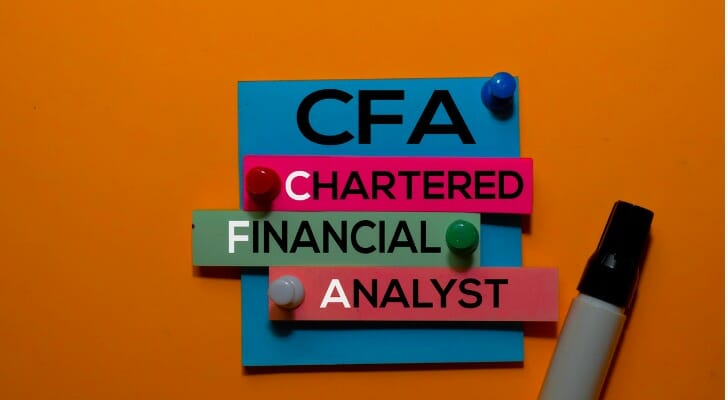There is a wide variety of training for financial, investment and business expertise. Two of the most readily recognized and broadly accepted designations are the charted financial analyst (CFA) designation and the master of business administration (MBA) degree.
Understanding the strengths of each one, and their differences, can help you find a financial professional whose training will be most useful to you.
CFA vs. MBA: Key Points
The chartered financial analyst (CFA) designation is an internationally recognized certification from the CFA Institute. Earning one of these shows you have professional-level skills in asset management, investment analysis, portfolio strategy and corporate finance.
A master of business administration (MBA) is a degree available from any number of graduate business schools. Having an MBA signals mastery of a broad set of business skills. Those include some of the same financial management skills as a CFA. But they also range from marketing and operations to human resources and overall strategy.
These two advanced business certifications are somewhat alike but also quite different. As a result, many ambitious business people find themselves torn between pursuing one or the other. Here are the pluses and minuses of each.
CFA Pros

The CFA program is self-study. That means, among other things, that you can go more or less at your own pace. Most people seeking a CFA are also employed full-time while they study.
The skills learned to get a CFA focus narrowly on analyzing and managing investments. This makes CFAs real specialists and experts. Partly as a result of this tight focus, compared to newly minted MBAs, just-fledged CFAs tend to get higher-level entry jobs after certification. CFAs also earn more their first year.
A CFA also costs a lot less. A CFA can be obtained for a cash outlay of around $10,000. Graduate business school tuition can be $100,000 or more. And the CFA Institute places fewer prerequisites on applicants than most business schools do on graduate students.
CFA Cons
A CFA may not be the best choice for someone who isn’t sure about working in the investment field. The narrower field of study limits options.
Also, although a CFA can be completed in 18 months, most candidates take four years to complete the program. That’s twice as long as many MBA graduate programs. The exams are extremely rigorous, and failure rates are high.
The percentage of test takers who pass the first two levels is below 50%: the 10-year weighted average exam pass rate for Level I is 43% and for Level II it is 45%. Pass rates for the third and final test is about 56%.
While fees paid to the CFA Institute are far less than what MBA candidates pay to their schools, many CFA candidates spend considerable sums on outside tutors and preparation courses to boost their chances of passing the three exams.
MBA Pros

An MBA gives graduates a broad base in a variety of functional areas, not just investments. In a general business setting, MBAs are more likely than CFAs to get promotions. MBAs are equipped to make good decisions in many different functions and settings.
MBAs get hired by investment companies just as CFAs do. But almost every industry from manufacturing to consulting presents opportunities for an MBA. Because of their diverse skill sets MBA are potentially qualified for more jobs and more types of jobs in more fields.
Getting an MBA also takes less time than getting a CFA. Most MBA programs are two-year programs, and students graduate with their new degrees in that time span. CFAs, while technically doable in 18 months, generally take four years.
Networking is another comparative advantage MBA holders have over CFA holders. Graduate business school classes are excellent places to meet people who can help your career later on. CFA study is less collegial and less likely to create potentially valuable connections.
MBA Cons
To earn an MBA in most cases requires a full-time commitment to attending classes. There are part-time MBA programs as well as ones with remote/online features, but the typical MBA student isn’t also working full-time. That’s the opposite of the CFA. A CFA is typically earned by someone who studies part-time while working full-time.
Foregoing two years of earnings to get an MBA is a major financial investment in your career. But MBA tuition may be even more costly. Sometimes tuition can be considerably more depending on the college.
In addition, to get into MBA school requires already having a four-year bachelor’s degree. A CFA can substitute four years of work experience. Devoting the time and tuition to getting a four-year degree is another significant expense would-be MBAs incur.
The value of an MBA depends partially on the reputation of the school that confers the degree. An MBA from an Ivy League school will probably result in the new graduate getting a higher-paying job offer that one from a middling government school. If you can’t get an MBA from a prestigious or highly ranked school, the alternatives may not be worth it, on a cost-benefit basis.
Even after all this, the would-be graduate business student still must get a satisfactory score on the Graduate Record Examinations or the Graduate Management Admission Test. Finally, some business schools also require some professional work experience on top of all these other prerequisites.
The Bottom Line
Whether you choose to pursue a CFA or MBA depends largely on your career path. Someone who wants just to manage investments is likely better off with a CFA. Someone who isn’t sure about career path is likely to do better with the general business foundation of an MBA.
Tips on Finances
- Consider working with a financial advisor as you make decisions about your portfolio. If you don’t have a financial advisor yet, finding one doesn’t have to be hard. SmartAsset’s free tool matches you with up to three vetted financial advisors who serve your area, and you can interview your advisor matches at no cost to decide which one is right for you. If you’re ready to find an advisor who can help you achieve your financial goals, get started now.
- If you’re new to investing or would simply like to increase your knowledge, here’s a useful resource for both the novice and the pro.
Photo credit: ©iStock.com/JGalione, ©iStock.com/MicroStockHub, ©iStock.com/syahrir maulana
